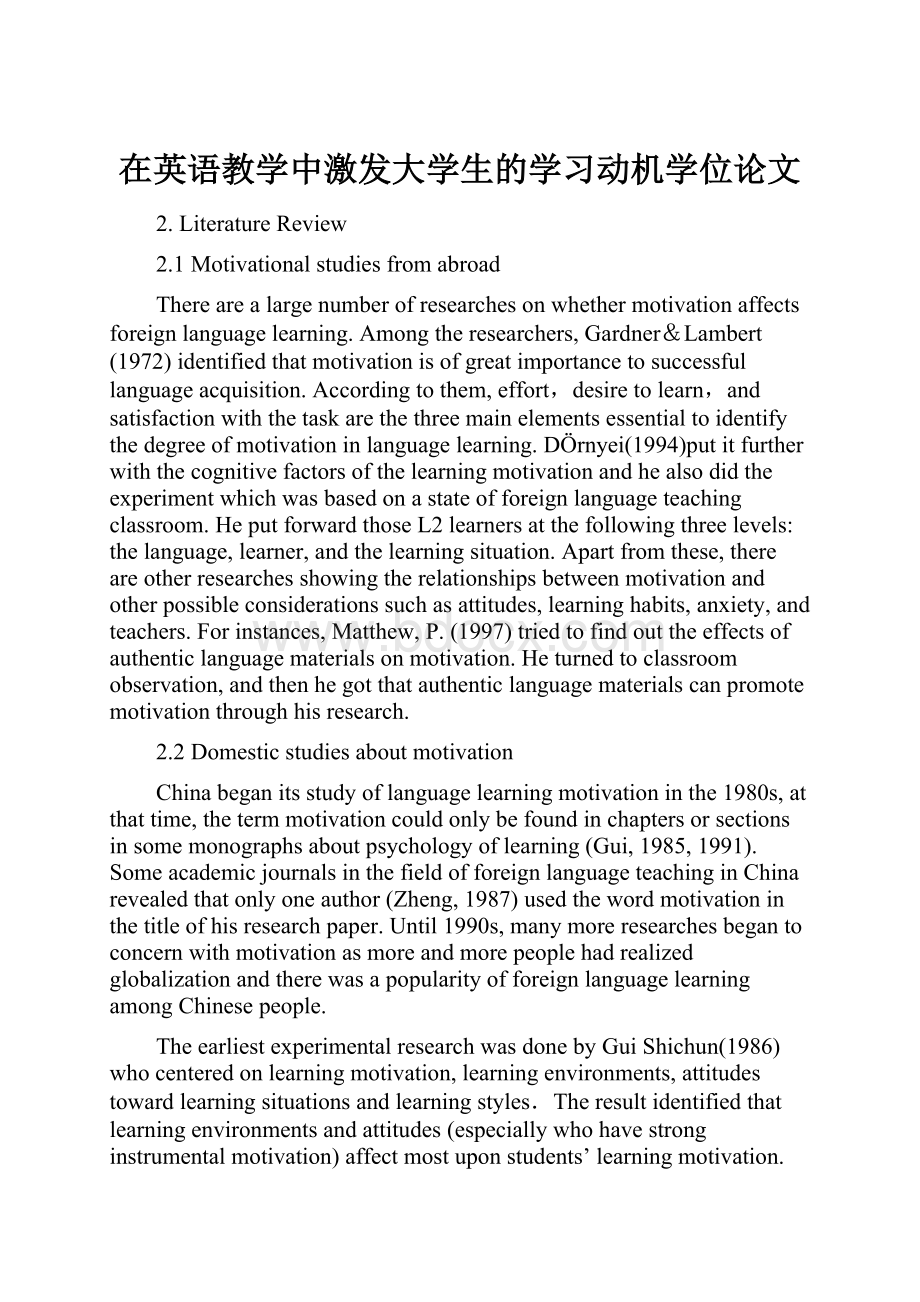在英语教学中激发大学生的学习动机学位论文.docx
《在英语教学中激发大学生的学习动机学位论文.docx》由会员分享,可在线阅读,更多相关《在英语教学中激发大学生的学习动机学位论文.docx(10页珍藏版)》请在冰豆网上搜索。

在英语教学中激发大学生的学习动机学位论文
2.LiteratureReview
2.1Motivationalstudiesfromabroad
Therearealargenumberofresearchesonwhethermotivationaffectsforeignlanguagelearning.Amongtheresearchers,Gardner&Lambert(1972)identifiedthatmotivationisofgreatimportancetosuccessfullanguageacquisition.Accordingtothem,effort,desiretolearn,andsatisfactionwiththetaskarethethreemainelementsessentialtoidentifythedegreeofmotivationinlanguagelearning.DÖrnyei(1994)putitfurtherwiththecognitivefactorsofthelearningmotivationandhealsodidtheexperimentwhichwasbasedonastateofforeignlanguageteachingclassroom.HeputforwardthoseL2learnersatthefollowingthreelevels:
thelanguage,learner,andthelearningsituation.Apartfromthese,thereareotherresearchesshowingtherelationshipsbetweenmotivationandotherpossibleconsiderationssuchasattitudes,learninghabits,anxiety,andteachers.Forinstances,Matthew,P.(1997)triedtofindouttheeffectsofauthenticlanguagematerialsonmotivation.Heturnedtoclassroomobservation,andthenhegotthatauthenticlanguagematerialscanpromotemotivationthroughhisresearch.
2.2Domesticstudiesaboutmotivation
Chinabeganitsstudyoflanguagelearningmotivationinthe1980s,atthattime,thetermmotivationcouldonlybefoundinchaptersorsectionsinsomemonographsaboutpsychologyoflearning(Gui,1985,1991).SomeacademicjournalsinthefieldofforeignlanguageteachinginChinarevealedthatonlyoneauthor(Zheng,1987)usedthewordmotivationinthetitleofhisresearchpaper.Until1990s,manymoreresearchesbegantoconcernwithmotivationasmoreandmorepeoplehadrealizedglobalizationandtherewasapopularityofforeignlanguagelearningamongChinesepeople.
TheearliestexperimentalresearchwasdonebyGuiShichun(1986)whocenteredonlearningmotivation,learningenvironments,attitudestowardlearningsituationsandlearningstyles.Theresultidentifiedthatlearningenvironmentsandattitudes(especiallywhohavestronginstrumentalmotivation)affectmostuponstudents’learningmotivation.
IntheinvestigationofZhouYan(1992),heconcludedthatmotivationiscorrelatedwithlearningachievement.HaoMeiandHaoRuoping(2001)reportedthatstudents’achievementmotivationispositivelyrelatedtotheirfinalscores,butnegativelyrelatedtotheirstateanxiety.
InstudyofindividualdifferencesonmotivationconductedbyWuYi’anandLiuRunqing(1993),theyfoundthatChineselearners’Englishlearningmotivationwere,moreoftenthannot,instrumental.Accordingtotheirstudy,gettingacertificateisthemajormotivationofChineselearnerswhichisdifferentfromthemotivationtypeofstudentsinothercountries.
WenQiufang(1995,2001),whoanalyzedtherelationshipbetweenmotivationandlearningstrategies,classifiedmotivationintotwocategories:
superficialanddeepmotivations.Theyalsofoundthatmotivationiscorrelatedwithlanguagelearningbeliefsandstrategies.Apartfromthisclassification,GaoYihongeta1.(2003),summedupthatthereareseventypesofmotivationamongstudentswhichareinterest,achievement,learningcontext,goingabroad,socialresponsibility,personaldevelopmentandinformationmedia.
Toconclude,ChineseresearchersadoptthetheoriesofthestudyofmotivationonL2learningfromoverseasanddevelopitsowntheoriesbasedontherealsituationinlandthroughinvestigation,realclassroomcontextandsoon.Factors,suchaslearningenvironment,interest,teacher,passingexams,socialresponsibility,peers,affectstudents’learningmotivation.TheabovetheoriesnotonlyenrichthemotivationtheoriesofL2learning,butalsohelpustoknowwhatproblemsarestillexist,howwecanimprovestudents’Englishlearning.
3.Motivation
3.1Definitionofmotivation
Motivationiscommonlythoughtofastheinnerdrive,impulse,emotionordesirethatmovesonetoparticularaction(Brown,1981:
121).AsstatedbyHarmer,J.(1983)thatmotivationissomekindofinnerdrivethatencouragesomebodytopursuitacourseofaction.
Gardner’sdefinitionofmotivation,whichisbasedonsocialpsychology,islargelyacceptedandfrequentlyquoted.AsonsocialnatureofL2learning,hedefinesmotivationtolearnaL2astheextenttowhichtheindividualworksorstrivestolearnthelanguagebecauseofadesiretodosoandthesatisfactionexperiencedinthisactivity(Gardner,1985:
1).AndwhenmotivationisappliedinEnglishlearning,motivationcanbeadecisivefactorforlearnerstosucceedinlearningEnglish.Thereisalargebodyofresearchdocumentinghowknowledgeandexperiencearedynamicallyrelatedtomotivation(Graham&Golan,1991).
WhenmotivationisappliedinEnglishlearning,itisnotonlyanintensivedesireforlearningandacquiringknowledge,butalsoaninnerpowertopushstudentsforwardwithenthusiasmandwillingness.StudentswhoaremotivatedstronglyarelikelytotakeacorrectandpositiveattitudetowardsstudyandwillthusworkhardinlearningEnglish.Consequentlythestudentscangetbettergradethanthosewhohaven’tbeenmotivatedorthosewhodon’thaveanyinterestinlearningEnglish.
Fromthedefinitionandtheoryabove,wecanseethatmotivationisaprocessrelatedtothementalstate.Itisassociatedwithvariousdecision-making,intentions,determinations,personalimpulseandsoon.FromhowGardnerdefinesmotivationinlanguagelearning,wecouldseethatmotivationisanimportantfactorinlanguagelearningsinceonceone’slearningmotivationisaroused,he/shewillprobablytryeverywaytoworkhardunlesshe/shereachesthegoal.Soitisessentialforustounderstandmotivationinadeepstate,especiallywhenitisusedinEnglishlearning.
3.2Typesofmotivation
3.2.1Integrativemotivationandinstrumentalmotivation
RobertGardnerandWallaceLambert(1972),whoseaimwasstudyinghowattitudeandmotivationaffectlanguagelearning,haddonealargenumberofinvestigationsandresearcheswithforeignlanguagelearnersinCanada,somepartsoftheUnitedStates,andthePhilippinesforovertwelveyears.Basedontheirresearchfindings,theygroupedmotivationastwobasickinds:
Integrativemotivationandinstrumentalmotivation.
i)Integrativemotivation
Integrativemotivationappearswhenlearnerswishtointegratethemselveswithinthecultureofasecondlanguagegroup,toidentifythemselveswithandbecomeapartofthesociety(GardnerandLambert,1972).Whenoneshowshisrealinterestinthepeopleandthecultureofoneparticularcommunity(especiallywheretheyneedtospeakaforeignlanguage),hewillbemotivatedbytheneedsthatacquiringthesecondlanguagewillenablehimtomeetwithandtalktothetargetlanguagespeakers.
ii)Instrumentalmotivation
Instrumentalmotivationreferstothemotivationtoacquirealanguageasmeansforattaininginstrumentalgoals:
furtheringacareer,readingtechnicalmaterial,translation,andsoforth(GardnerandLambert,1972).Comparedwithintegrativemotivation,instrumentalmotivationfocusesmoreonthepracticalvalueandadvantagesoflearninganewlanguageinthatainstrumentalmotivatedpersonoftenshowsarelativelylimitedinterestinthepeopleandthecultureofthetargetlanguagecommunity.Inthiscase,onelearnsthelanguagemainlybecausehe/sheneedsitforoneormorecertainpurposes.
However,thisclassificationofintegrativeandinstrumentalmotivationisnotsuitabletobeappliedhere.AsBrajKachru(1977-1992)notedthatinthedevelopingcountrieswhereEnglishhasbecomeaninternationallanguage,peoplelearnEnglishwellforinstrumentalreasonsalone.Sothiskindofclassificationcannotillustratehowwelloneismotivated,becausenomatteroneismotivatedbytheintegrativeorinstrumentalfactororboth,thedegreeofhowwelloneismotivatedisstillunknown.However,ifwewanttomotivatestudentseffectively,weneedtoknowhowwellstudentsaremotivatedandwhichkindofmotivationcanhelptheminEnglishlearning.
3.2.2Extrinsicmotivationandintrinsicmotivation
i)Extrinsicmotivation
Extrinsicmotivationregardstoouterfactors,suchasprizes,appraisals,complimentsorfeedbacks.Inaword,asLatham(1998)statedextrinsicmotivationisrelatedto"Tangiblebenefits".Itexistswhenindividualsaremotivatedbyanoutcomethatisexternalorfunctionallyunrelatedtotheactivityinwhichtheyareengaged(Spaulding,1992:
4).Forexample,astudentwhoismotivatedbyparents’complimentwillworkhardtogethighscores;hiseffortsaremadeforextrinsicreasonaloneinsteadofgainingtheknowledgeitselforhavingarealinterestoflearning.
ii)Intrinsicmotivation
Onthecontrary,intrinsicmotivationisaresponsetoneedsthatexistswithinthelearner,suchascuriosity,theneedtoknow,andfeelingsofcompetenceorgrowth(Eggen&Kauchak,1994:
428).Itisalsocalleddirectsatisfactionforitreferstolearnerswhogetsatisfactionderivedfromlearning.Itexistswhensomeoneworksbecauseofaninnerdesiretoaccomplishatasksuccessfully,whetherithassomeexternalvalueornot(Spaulding,1992:
4).Acaseinpointisthatastudentmakeseveryefforttolearntheknowledgebecauseheisinwardlyinterestedatthatsubjectandwantstoknowmoreaboutit.Hiswillingforlearningthatsubjectwellgrowsandcausesintrinsicmotivation.Hispurposeoflearningisfortheenjoymentofthelearningprocessratherthanforpraisesorrewards.
Inconclusion,wecanseethatbothextrinsicandintrinsicmotivationbooststudy,theyarebothimportantandcomplementarytoeachother.Theoutwardpraisesandrewardsencouragestudentstostudymoreactivelywhiletheinwardinterestmakeson